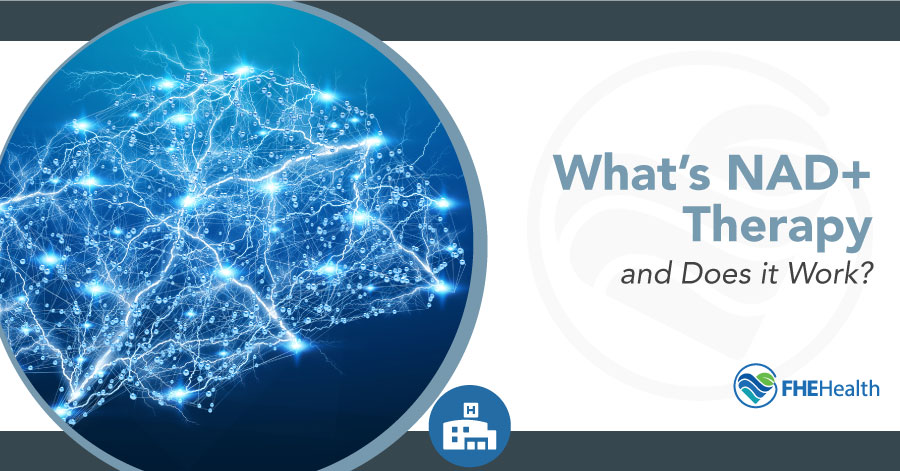
A new treatment method advertised to be an all-natural miracle cure for things like Alzheimer’s disease and chronic fatigue also claims to be effective in eliminating cravings for drugs and alcohol. It’s called NAD therapy, and if these claims are true, it could have major implications in the addiction treatment community.
But as we’ve seen with other emerging therapies, there’s a lot of disagreement in the addiction treatment industry and the scientific community as a whole.
At FHE Health, we’re always exploring the latest developments in recovery science so we can adopt the latest proven methods and provide the best care for our clients in mental health and addiction treatment. In this piece, we’ll talk about what NAD (or NAD+) therapy is, discuss any research that exists around it and assess whether the industry should be embracing it for the well-being of clients in treatment.
What Is NAD+ Therapy?
NAD is short for nicotinamide adenine dinucleotide, a metabolism catalyst involved in the creation of a variety of different types of cells. It occurs naturally in the body as part of many key functions, but the primary one is the body’s process of creating energy for processes to take place.
NAD IV therapy involves being put on an intravenous drip with a solution containing NAD. The infusion may also contain other ingredients like amino acids. Allegedly, it causes a near-immediate increase in energy and overall health.
What Are NAD Therapy’s Claims as a Treatment for Substance Abuse?
When used as part of a detox program in recovery, NAD has a variety of advertised benefits that are supposed to help people recover more quickly and with fewer uncomfortable side effects.
When used during detox, NAD is supposed to eliminate cravings and reduce the uncomfortable symptoms of withdrawal, especially when used in recovery from alcoholism.
One of the theories that support NAD’s use in addiction treatment revolves around the idea of “replacement drugs.” It’s thought that since many treatment methods include using methadone or buprenorphine to help a person stop using a more dangerous substance, a natural influence like NAD can help them get clean without the risk of becoming addicted to something else.
Conventionally, treatment programs have embraced medication-assisted treatment (MAT) because the drugs like Suboxone® are the lesser of two evils when compared to a drug like heroin, for example. If there were a natural substance that did a better job helping people get sober, it would be influential in the future of addiction treatment.
What the Research Says About NAD+ Therapy
Unfortunately, not much. Harvard studied NAD’s potential anti-aging benefits, but no significant research has been done that applies to addiction treatment as of this point in time.
Like many new therapies, there’s not much verifiable data out there to help make a decision one way or the other about the legitimacy of the claims. This points to the treatment lacking legitimate backing. When new treatments using drugs and other chemicals are introduced in the right way, results are verified using scientific research. They are also usually assessed by the US Food and Drug Administration (FDA). With NAD therapy, none of this has happened.
The problem is that despite the lack of data on the science behind NAD therapy, robust claims continue to be made by rehab providers who have embraced this experimental practice in their facilities.
These NAD treatment centers are popping up more and more across the country, capitalizing on the popularity of the claims being made, but few are attempting to back up these statements with actual science.
Anecdotal Evidence
This leaves most of the leverage for NAD as a detox aid and potential cure for addiction in the arena of patient stories and anecdotes. Many NAD treatment centers market using testimonials from clients who had allegedly “tried everything” to no avail. In these cases, the subjects said that they heard about NAD, tried it for themselves and experienced a range of benefits that helped them get clean once and for all.
As experienced treatment industry professionals and rehab veterans can attest, recovery is extremely difficult. Detox can be extremely uncomfortable, relapse is common, and if there truly was a shortcut to sobriety out there, everyone would hear about it on the first day it was released.
Potential Risks
Let’s assume for a moment that NAD therapy isn’t effective. The concern here is that if NAD therapy is being used in rapid detox, dangerous side effects of withdrawal can occur. With drugs like alcohol and benzodiazepines, withdrawal comes with a heightened risk of seizures, which can be fatal if detox isn’t managed in the right way.
This is why most treatment programs offer medical detox, helping clients get clean in a clinical setting with constant supervision.
The Verdict
When a new treatment makes claims of effectiveness, it’s easy to understand why people jump at the chance to experience the effects for themselves. Many people struggling with alcoholism and substance abuse are desperate for something that will help them, and a treatment that seems like a shortcut can be an appealing place to start.
It’s worth noting, though, that it’s rare for anything to be as effective as it claims to be, especially when those claims are as dramatic as they are with NAD+ therapy.
At this time, there’s not enough information to make a definitive ruling one way or another on the effectiveness of NAD.
Addiction Treatment at FHE Health
At FHE Health, we like to keep an open mind about the new treatment methods that emerge in the industry because we have to stay at the cutting edge of our field to provide treatment with our client’s best interests in mind.
To learn about the therapies we offer to help address mental and behavioral health issues in our facility, contact us today.






